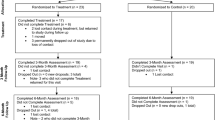Abstract
This study explicated associations between trauma-related cognitions and condomless sex, examining avoidance coping style and behavior (i.e., substance use) as intermediate variables, among a group disproportionately affected by both trauma and HIV. Two hundred and ninety HIV-negative MSM with a history of childhood sexual abuse (CSA) completed a cross-sectional psychosocial battery. Trauma-related cognitions were positively associated with more acts of condomless sex. Indirect associations on condomless sex were driven by avoidance coping, but not substance use. Findings indicate a need to address trauma-related cognitions and avoidance coping within interventions for reducing HIV risk among MSM with a history of CSA.
Similar content being viewed by others
Data Availability
The data and code are accessible on request from the principal investigator.
References
Mimiaga MJ, Noonan E, Donnell D, Safren SA, Koenen KC, Gortmaker S, et al. Childhood sexual abuse is highly associated with HIV risk-taking behavior and infection among MSM in the EXPLORE Study. J Acquir Immune Defic Syndr. 2009;51(3):340–8.
O’Cleirigh C, Safren SA, Mayer KH. The pervasive effects of childhood sexual abuse: challenges for improving HIV prevention and treatment interventions. J Acquir Immune Defic Syndr. 2012;59(4):331–4.
Sweet T, Welles SL. Associations of sexual identity or same-sex behaviors with history of childhood sexual abuse and HIV/STI risk in the United States. J Acquir Immune Defic Syndr. 2012;59(4):400–8.
Lloyd S, Operario D. HIV risk among men who have sex with men who have experienced childhood sexual abuse: systematic review and meta-analysis. AIDS Educ Prev. 2012;24(3):228–41.
O’Cleirigh C, Safren SA, Taylor SW, Goshe BM, Bedoya CA, Marquez SM, et al. Cognitive behavioral therapy for trauma and self-care (CBT-TSC) in men who have sex with men with a history of childhood sexual abuse: a randomized controlled trial. AIDS Behav. 2019;23(9):2421–31.
Collin-Vezina D, Daigneault I, Hebert M. Lessons learned from child sexual abuse research: prevalence, outcomes, and preventive strategies. Child Adolesc Psychiatry Ment Health. 2013;7(1):22.
Batchelder AW, Moskowitz JT, Jain J, Cohn M, Earle MA, Carrico AW. A novel technology-enhanced internalized stigma and shame intervention for HIV-positive persons with substance use disorders. Cogn Behav Pract. 2020;27(1):55-69.
Foa EB, Ehlers A, Clark DM, Tolin DF, Orsillo SM. The Posttraumatic Cognitions Inventory (PTCI): development and validation. Psychol Assess. 1999;11(3):303–14.
Yi H, Sandfort TG, Shidlo A. Effects of disengagement coping with HIV risk on unprotected sex among HIV-negative gay men in New York City. Health Psychol. 2010;29(2):205–14.
Batchelder AW, Safren SA, Coleman JN, Boroughs MS, Thiim A, Ironson GH, et al. Indirect effects from childhood sexual abuse severity to PTSD: the role of avoidance coping. J Interpers Viol. 2021;36(9–10):5476–95.
Sheehan DV, Lecrubier Y, Sheehan KH, Amorim P, Janavs J, Weiller E, et al. The Mini-International Neuropsychiatric Interview (MINI): the development and validation of a structured diagnostic psychiatric interview for DSM-IV and ICD-10. J Clin Psychiatry. 1998;59(Suppl 20):22–33.
Carver CS. You want to measure coping but your protocol’s too long: consider the brief COPE. Int J Behav Med. 1997;4(1):92–100.
Coleman JN, Batchelder AW, Kirakosian N, Choi KW, Shipherd JC, Bedoya CA, et al. Indirect effects of dissociation on the relationship between lifetime PTSD symptoms and condomless sex among men who have sex with men with a history of childhood sexual abuse. J Trauma Dissoc. 2021;23:1–17.
Hayes AF, Montoya AK, Rockwood NJ. The analysis of mechanisms and their contingencies: PROCESS versus structural equation modeling. Australas Mark J. 2017;25(1):76–81.
Herta DC, Nemes B, Cozman D. Cognitive appraisal of exposure to specific types of trauma—a study of gender differences. BMC Womens Health. 2017;17(1):1–10.
Crepaz N, Marks G. Towards an understanding of sexual risk behavior in people living with HIV: a review of social, psychological, and medical findings. AIDS. 2002;16(2):135–49.
Whiffen VE, MacIntosh HB. Mediators of the link between childhood sexual abuse and emotional distress: a critical review. Trauma Viol Abuse. 2005;6(1):24–39.
Acknowledgements
We wish to thank the participants involved in this research study.
Funding
This work was supported by NIMH (Grant No. R01MH095624, PI Dr. Conall O’Cleirigh). Dr. Daniel Hall’s time was supported by NCCIH (Grant No. K23AT010157). Dr. Abigail Batchelder’s time was supported by NIDA (Grant No. K23DA043418). Dr. Calvin Fitch’s and Dr. Tiffany Glynn's time was supported by NIAID T32AI007433 (PI: Kenneth Freedberg). Drs. Safren and Ironson were also supported by 1P30MH116867 for author time.
Author information
Authors and Affiliations
Contributions
DLH: Conceptualization, Formal Analysis, Writing original draft. AWB: Formal Analysis, Writing original draft, review, and editing. CJF: Writing original draft, review, and editing. TRG: Writing original draft, review, and editing. GI: Investigation, Resources, Writing review and editing. HM: Project administration, Writing review and editing. SAS: Investigation, Resources, Writing review and editing. COC: Conceptualization, Formal Analysis, Funding acquisition, Investigation, Resources, Writing review and editing. All the authors agreed for the final version to be submitted for peer review and possible publication.
Corresponding author
Ethics declarations
Conflict of interest
The authors declare no conflicts of interest.
Ethical Approval
IRB approval was granted by all participating institutions, including Fenway Health, Massachusetts General Hospital, and the University of Miami.
Consent to Participate
All participants provided informed consent.
Consent for Publication
Not applicable.
Additional information
Publisher's Note
Springer Nature remains neutral with regard to jurisdictional claims in published maps and institutional affiliations.
Rights and permissions
Springer Nature or its licensor holds exclusive rights to this article under a publishing agreement with the author(s) or other rightsholder(s); author self-archiving of the accepted manuscript version of this article is solely governed by the terms of such publishing agreement and applicable law.
About this article
Cite this article
Hall, D.L., Batchelder, A.W., Fitch, C.J. et al. Posttraumatic Cognitions and Condomless Sex Among Men Who Have Sex with Men (MSM) with a History of Childhood Sexual Abuse: The Role of Avoidance Coping. AIDS Behav 27, 667–672 (2023). https://doi.org/10.1007/s10461-022-03801-7
Accepted:
Published:
Issue Date:
DOI: https://doi.org/10.1007/s10461-022-03801-7




